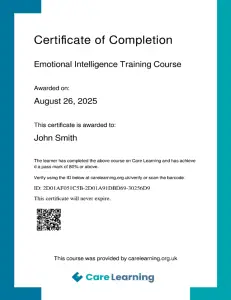Paranoia is a distressing experience that can affect a person’s thoughts, feelings, and behaviours. It often involves intense suspicion or mistrust of others, which may be linked to delusions of persecution or distorted perceptions of reality. In health and social care, understanding paranoia is essential to providing safe, empathetic, and effective support.
This free paranoia awareness online course explores the concept of paranoia, its causes, risk factors, and how it relates to mental illnesses such as schizophrenia and personality disorders. Learners will also gain practical knowledge of support strategies, treatments, and ways to care for individuals experiencing paranoia in a safe and respectful manner.
Why Take This eLearning Course?
Paranoia can have a profound impact on relationships, mental health, and daily life. Without awareness and the right support, individuals may feel isolated or misunderstood. This course helps professionals, carers, and learners build confidence in recognising paranoia and supporting those affected.
Here’s why this course is for you:
- Clarity on paranoia: Learn what paranoia is, its characteristics, and how it differs from general worry or mistrust.
- Understand causes and risks: Explore stress, anxiety, genetic predispositions, and underlying mental health conditions.
- Recognise links with mental illness: Understand how paranoia relates to conditions such as paranoid schizophrenia and paranoid personality disorder.
- Spot the signs: Identify behavioural, emotional, and physical signs of paranoia.
- Know the triggers: Learn about internal and external triggers and how paranoia affects daily life and relationships.
- Explore treatments: Gain insight into therapies such as CBT, medication, and supportive care.
- Self-help and coping: Discover strategies to challenge paranoid thoughts and manage symptoms.
- Care with compassion: Learn practical approaches to supporting individuals, creating safe environments, and accessing referral pathways.
Paranoia Awareness Course Content Outline
Module 1: Understanding Paranoia
Learners will define paranoia and explore its main characteristics, such as mistrust, suspicion, and misinterpreting harmless events as threats. They will also examine delusions of persecution and how distorted reality shapes a person’s experiences.
Module 2: Causes and Risk Factors
This module looks at the common causes of paranoia, including stress, anxiety, trauma, sleep problems, and substance misuse. Learners will also identify risk factors such as genetics, childhood experiences, and underlying mental health conditions.
Module 3: Paranoia and Mental Illness
Learners will examine how paranoia is linked to mental health conditions including psychosis, schizophrenia, bipolar disorder, and severe depression. They will explore examples such as paranoid schizophrenia and paranoid personality disorder.
Module 4: Recognising Signs and Symptoms
This module focuses on behavioural, emotional, and physical signs of paranoia. Learners will identify paranoid behaviours, suspicious thoughts, and physical responses such as agitation, fear, and hypervigilance.
Module 5: Triggers and the Impact on Daily Life
Learners will distinguish between internal and external triggers of paranoia, such as trauma, conflict, and social isolation. They will also examine how paranoia affects relationships, employment, education, and daily routines.
Module 6: Treatments and Support Strategies
This module introduces treatment options, including Cognitive Behavioural Therapy (CBT) and medication. Learners will also explore self-help strategies such as identifying triggers, challenging thoughts, and practising relaxation techniques.
Module 7: Supporting Individuals with Paranoia
Learners will review approaches to providing compassionate care, including listening without judgement, maintaining consistency, and creating safe environments. They will also understand the role of family and carers, and when to refer individuals to professional services.
Learning Outcomes
By the end of this course, you will be able to:
- Define paranoia and describe its main characteristics.
- Explain delusions of persecution and their impact on reality perception.
- Recognise the prevalence of paranoia in mental health contexts.
- Identify common causes and risk factors, including stress, genetics, and comorbid conditions.
- Understand the relationship between paranoia and specific mental illnesses.
- Recognise behavioural, emotional, and physical signs of paranoia.
- Describe internal and external triggers and their effects on daily life.
- Outline evidence-based treatments such as CBT and medication.
- Identify coping strategies and the role of families and carers in support.
- Apply safe, supportive approaches when caring for individuals with paranoia.
- Understand referral pathways and how to access professional help.
Target Audience
This course is suitable for:
- Health and social care professionals.
- Carers and support workers providing direct care.
- Students and learners preparing for roles in mental health or social care.
- Families or individuals wanting to better understand paranoia.
No prior knowledge is required, making this an accessible introductory course.
FAQ
What does the course cover?
It covers the definition, causes, symptoms, triggers, and treatments of paranoia, as well as strategies for support and care.
Can I apply what I learn immediately?
Yes. The course includes practical examples and strategies you can use in health and social care roles.
How long will it take?
The course is self-paced and usually takes 1 hours to complete.
Will I receive a certificate?
Yes. A certificate is provided upon completion.
Is this course relevant to UK practice?
Absolutely. The course includes UK-focused guidance and referral information.
Is this course CPD accredited?
Not yet, but accreditation is being developed.
Paranoia can be isolating and overwhelming—but with the right awareness and support, individuals can feel understood and cared for. This course equips you with the knowledge, skills, and confidence to recognise paranoia and respond with empathy.
Join today and take the next step in supporting people experiencing paranoia.
You must log in and have started this course to submit a review.
Paranoia Awareness Training Course CPD Accredited and Government Funding
We’re working on getting this Paranoia Awareness Training Course CPD accredited, and any course that’s approved will be clearly labelled as CPD accredited on the site. Not every health and social care course has to be accredited to help you meet CQC expectations – what matters is that staff are competent, confident and properly trained for their roles under Regulation 18. Our courses are built to support those requirements, and because they’re not government funded there are no eligibility checks or ID needed – you can enrol and start learning straight away.



